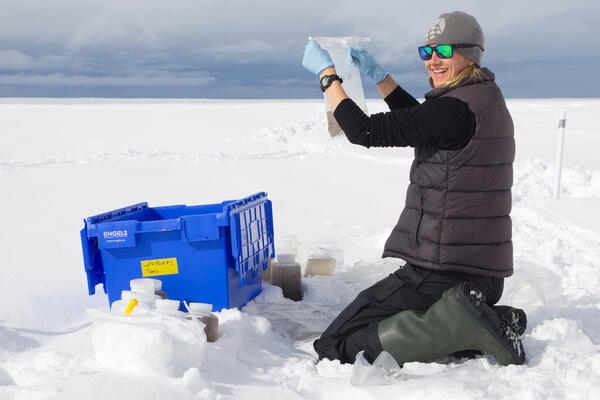
PhD student uses DNA sequencing to study cyanobacteria
Ellen Cameron studies cyanobacteria communities in the low-nutrient, clear lakes of Northern Ontario

Ellen Cameron studies cyanobacteria communities in the low-nutrient, clear lakes of Northern Ontario
By Allie Dusome Water InstituteCyanobacteria blooms are a major environmental issue worldwide. They can have direct impacts on the safety of drinking water supplies by producing a variety of toxins which also impose health risks for swimmers and boaters. Although many may associate cyanobacteria with bright green algae seen on the surface of lakes, Ellen Cameron, PhD Candidate in Waterloo’s Biology Department, is using DNA sequencing to study cyanobacteria communities in low-nutrient, clear lakes in Northern Ontario.
“Even though the lakes I’m working in look like stereotypical picturesque lakes of Ontario, they have high abundances of cyanobacteria,” said Cameron. “We are trying to better understand the cyanobacteria communities that are in these lakes by using DNA sequencing to look for specific genetic markers that can tell us about the identity of organisms and what functions they may be performing.”
Cameron is working alongside researchers in professor Monica Emelko’s forWater project. Her research sites are part of a long-term research station operated by Natural Resources Canada and Environment and Climate Change Canada in the Turkey Lakes Watershed. Cameron and her team discovered that at some of the sampling points, cyanobacteria composed 60 percent of the total microbial community. Using metagenomic shotgun sequencing, a technique that sequences all of the DNA present in the sample, Cameron and her team were able to recover three high-quality genomes for select cyanobacteria found in the lakes which contain the genetic information for these organisms. This discovery will help to understand the pathways and functions of these organisms further.
“The recovery of the cyanobacteria genomes and identification of toxin genes will provide critical insight for understanding the threats that cyanobacteria impose in low-nutrient systems that may not have visible blooms,” said Cameron.
Co-supervised by Water Institute members Kirsten Müller, professor in the Department of Biology, and Monica Emelko, Canada Research Chair in Water Science, Technology & Policy and professor in the Department of Civil and Environmental Engineering, Cameron hopes that her research will improve frameworks for the design of ecologically meaningful sampling protocols for cyanobacteria monitoring.
Cameron acknowledged the benefits of working in interdisciplinary teams while working on wicked water problems: “The co-supervision has allowed me to gain support from both lab groups which has been an invaluable experience and has helped provide me with insights into my data that as a biologist alone, I might not have thought of,” said Cameron.

Read more
A PhD student partners with Indigenous elders and fishers to understand a changing fish population in Nunavut

Read more
Pharmacist and entrepreneur Rui Su creates MedMe Health to enable pharmacists to deliver maximum clinical value

Read more
How algae fuelled by phosphorus contributes to ice sheet melting
The University of Waterloo acknowledges that much of our work takes place on the traditional territory of the Neutral, Anishinaabeg, and Haudenosaunee peoples. Our main campus is situated on the Haldimand Tract, the land granted to the Six Nations that includes six miles on each side of the Grand River. Our active work toward reconciliation takes place across our campuses through research, learning, teaching, and community building, and is co-ordinated within the Office of Indigenous Relations.